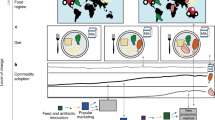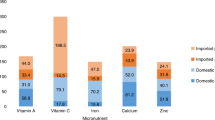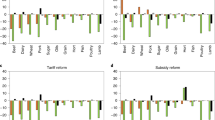Abstract
The EAT–Lancet planetary health diet (PHD) provides guidelines on a global scale and calls for red meat consumption to be halved. Operational PHD guidelines at country level have yet to be determined. Here we argue that the biological link between milk and bovine-meat production must be considered when operationalizing the globally calculated PHD to national contexts. Using a stylized computer simulation model rooted in a food system approach, we explore the impact of dietary scenarios on milk and bovine-meat production and show that ignoring this biological link can lead to substantial imbalances between national dietary guidelines and production outcomes and potentially lead to food waste. Furthermore, we assess current national dietary guidelines in Europe and find that most disregard this biological link and are incompatible with the PHD, with implications for policymakers and consumers to consider when adapting the PHD in national contexts.
This is a preview of subscription content, access via your institution
Access options
Access Nature and 54 other Nature Portfolio journals
Get Nature+, our best-value online-access subscription
$29.99 / 30 days
cancel any time
Subscribe to this journal
Receive 12 digital issues and online access to articles
$119.00 per year
only $9.92 per issue
Buy this article
- Purchase on Springer Link
- Instant access to full article PDF
Prices may be subject to local taxes which are calculated during checkout

Similar content being viewed by others
Data availability
The data that support the findings of this study are openly available.
An interactive version of the model is freely available at https://exchange.iseesystems.com/public/birgit/no-milk-without-meat.
The model and a full technical documentation are available at https://github.com/bkopains/no-milk-without-meat/. The model and its documentation are also submitted as Supplementary Information. The model can be run with the isee Player (https://www.iseesystems.com/softwares/player/iseeplayer.aspx). Source data are provided with this paper.
References
Willett, W. et al. Food in the Anthropocene: the EAT–Lancet Commission on healthy diets from sustainable food systems. Lancet https://doi.org/10.1016/S0140-6736(18)31788-4 (2019).
Rockström, J. et al. A safe operating space for humanity. Nature 461, 472–475 (2009).
Steffen, W. et al. Planetary boundaries: guiding human development on a changing planet. Science 347, 1259855 (2015).
Healthy Diets from Sustainable Food Systems. Food Planet Health Summary report of the EAT–Lancet Commission (EAT, 2019).
Beal, T., Ortenzi, F. & Fanzo, J. Estimated micronutrient shortfalls of the EAT–Lancet planetary health diet. Lancet Planet. Health 7, e233–e237 (2023).
Breidenassel, C. et al. The planetary health diet in contrast to the food-based dietary guidelines of the German Nutrition Society (DGE). Ernährungs Umschau 69, 56–72 (2022).
Herforth, A. et al. A global review of food-based dietary guidelines. Adv. Nutr. 10, 590–605 (2019).
Food and Agricultural Organization. FAOSTAT Emissions Intensities. https://www.fao.org/faostat/en/#data/EI. Accessed 13 Sept 2023.
Poore, J. & Nemecek, T. Reducing food’s environmental impacts through producers and consumers. Science 360, 987–992 (2018).
Harrison, M. R. et al. A scoping review of indicators for sustainable healthy diets. Front. Sustain. Food Syst. https://doi.org/10.3389/fsufs.2021.822263 (2022).
Kopainsky, B., Frehner, A. & Müller, A. Sustainable and healthy diets: synergies and trade-offs in Switzerland. Syst. Res. Behav. Sci. 37, 908–927 (2020).
Muller, A. et al. Strategies for feeding the world more sustainably with organic agriculture. Nat. Commun. https://doi.org/10.1038/s41467-017-01410-w (2017).
Making Better Policies for Food Systems (OECD, 2021).
Struben, J., Lee, B. H. & Bingham, C. B. Collective action problems and resource allocation during market formation. Strateg. Sci. 5, 245–270 (2020).
Food-Based Dietary Guidelines in Europe (European Commission, 2023); https://knowledge4policy.ec.europa.eu/health-promotion-knowledge-gateway/topic/food-based-dietary-guidelines-europe_en
Webb, P. et al. The urgency of food system transformation is now irrefutable. Nat. Food 1, 584–585 (2020).
EU Agricultural Outlook for Markets and Income, 2018–2030 (European Commission, DG Agriculture and Rural Development, 2018).
Food and Agriculture Organization. Global Livestock Environmental Assessment Model (GLEAM). https://www.fao.org/gleam/en/. Accessed 13 Sept 2023.
Schader, C. et al. Impacts of feeding less food-competing feedstuffs to livestock on global food system sustainability. J. R. Soc. Interface https://doi.org/10.1098/rsif.2015.0891 (2015).
Hayakawa, H., Hirai, T., Takimoto, A., Ideta, A. & Aoyagi, Y. Superovulation and embryo transfer in Holstein cattle using sexed sperm. Theriogenology 71, 68–73 (2009).
Statistische Erhebungen und Schätzungen 2020 über Landwirtschaft und Ernährung (Schweizerischer Bauernverband (SBV), 2021).
Sun, Z. et al. Dietary change in high-income nations alone can lead to substantial double climate dividend. Nat. Food 3, 29–37 (2022).
Springmann, M. & Freund, F. Options for reforming agricultural subsidies from health, climate, and economic perspectives. Nat. Commun. https://doi.org/10.1038/s41467-021-27645-2 (2022).
Candel, J. J. L. & Pereira, L. Towards integrated food policy: main challenges and steps ahead. Environ. Sci. Policy 73, 89–92 (2017).
Acknowledgements
We thank J. Struben and M. Tilebein for valuable feedback, and the participants of the 2022 International System Dynamics Conference for helpful comments on earlier versions of this paper. The authors received no financial support for the conduct of the research and the preparation of the article.
Author information
Authors and Affiliations
Contributions
B.K. designed the study, conceived and designed the experiments, performed the experiments, analysed the data, contributed materials and analysis tools, and wrote and reviewed the paper. F.K. designed the study, conceived and designed the experiments, reviewed the experiments, analysed the data, contributed materials and analysis tools, and wrote and reviewed the paper.
Corresponding author
Ethics declarations
Competing interests
The authors declare no competing interests.
Peer review
Peer review information
Nature Food thanks Hannah Van Zanten and the other, anonymous, reviewer(s) for their contribution to the peer review of this work.
Additional information
Publisher’s note Springer Nature remains neutral with regard to jurisdictional claims in published maps and institutional affiliations.
Supplementary information
Supplementary Information
Online methods and technical documentation.
Supplementary Data
Food-based dietary guidelines for milk and dairy products and for meat in 32 countries in Europe.
Source data
Source Data Fig. 1
Source data.
Rights and permissions
Springer Nature or its licensor (e.g. a society or other partner) holds exclusive rights to this article under a publishing agreement with the author(s) or other rightsholder(s); author self-archiving of the accepted manuscript version of this article is solely governed by the terms of such publishing agreement and applicable law.
About this article
Cite this article
Kopainsky, B., Kapmeier, F. Dynamic implications of the biological link between bovine milk and meat production for operationalizing the planetary health diet. Nat Food 4, 1070–1074 (2023). https://doi.org/10.1038/s43016-023-00883-x
Received:
Accepted:
Published:
Issue Date:
DOI: https://doi.org/10.1038/s43016-023-00883-x



